Jianmen Pass is called the No.1 Impregnable Pass in the world for its magnificence and danger, praised as the National Forest Park for its quietness and beauty and honored as National Natural & Cultural Heritage for its historic site. Except for these titles, Jianmen Pass is also listed in 5A Level Scenic Spots. Visitors from different countries and nations come to Jianmen Pass to explore its beautiful scenery and Three Kingdom culture as well as seek for excitement and adventure..
Most Popular Tour Packages include Jianmen Pass:
>> 4 Days Jianmen Pass & Langzhong Ancient City Tour with History Exploration
There is an old saying, “Conquest of Jianmen Pass means conquest of Sichuan”. Being strategically situated and difficult of access, Jianmen Pass was a natural defense for Sichuan which many kingdoms contested for.
During Three Kingdom Period, Zhuge Liang discovered Dajian Mountain on his way to fight with Wei State. He thought the tight and steep mountain was easy to hold but hard to attack, so he ordered his man to chip away the rocks and build the gate and set up the pass. He also had a 30-li path built in the valley between Mount Dajian and Mount Xiaojian for transporting military supplies. Years later, General Zhong Hui with his 100 thousand crack troops in Wei tried to attack Shu State through Jianmen Pass, but he was repelled by General Jiang Wei of Shu who stationed 30 thousand soldiers to hold fast to precipitous pass.
Unluckily, origin Jianmen Pass was destroyed in 1935 for building Sichuan-Shaanxi Road and the rebuilt Jianmen Pass was destroyed by Earthquake in 2008.
Served as No.1 Impregnable Pass in the world, Jianmen Pass attracts people with its plentiful scenic spots and main attractions covers Jianmen Pass, Jiange Road, Guanlou, Jiangwei Tomb, Zhong Hui Former Base, Shu Road, Stalagmite Peak, Liangshan Temple, Cuiping Peak etc. Most of you will give you great shot
Many officials in different dynasties built Guanlou (a gate tower in Jianmen Pass), but Guanlou was ruined by warfare again and again. Being rebuilt in Ming dynasty and restored in Qing Dynasty, Guanlou became more majestic and artistic. However, they were demolished to build road linking Sichuan and Shanxi. The existing Guanlou was rebuilt in 2009 in the same location. With a length of 18.3 m, width of 19.61 man depth of 17.7 m, Guanlou is still solemn and magnificent. Climbing up to Guanlou, you can appreciate a panoramic view of Jianmen Pass.
There are statues for Zhuge Liang, Liu Bei and Jiang Wei. Crossing Guanlou, a statue of Zhuge Liang came into your eyes. According to historical records, Jianmen Pass was first built by Zhuge Liang, so people called this statue “Kongming Li Guan” which means “Zhuge Liang built the pass”.
In south of statue of Zhuge Liang placed the statue of Emperor Liu Bei. After settled in Chengdu, Liubei set up Jiange County and keep the safety of the road from Chengdu to Shaanxi. It is recorded that Liu Bei had been Jianmen Pass for four times so the statue of Liu Bei was named “Liu Bei Guo Pass” which means “Liubei came to Jianmen Pass”.
Aside the west of Guanlou stood the statue of Jiang Wei, an outstanding general in Shu. He wore a helmet and his magnific manner and remarkable tolerance was shown in his pronounced nose, big eyes, thick eyebrows and plump lips. A monkey squatted in the right side of Jiang Wei. It seems that the monkey is staring at the pass with murderous look.
Also called Jiang Wei Temple and Jianggong Temple, Pingranghou Temple was built in memory of Jiang Wei. In the front square, there is another statue of Jiang Wei. In ancient times, Jiang Wei always commanded and watched the soldier’s drilling here. The temple is divided in two parts. Liu Bei, Guan Yu and Zhang Fei are worshiped in the front part while Jiang Wei is worshiped in the back part. This temple is also a replica temple within Jiang Wei Hall and Jiang Wei Tomb.
Red Star Square is a historical site where the Red Army fought a bloody war. In 2nd April 1935, the Red Fourth Army captured Jianmen Pass after a fierce fighting which made a miracle in the history. Without any doubt, this place became a patriotism-educational base and one red sightseeing place. Red Star Square consists of monument, memorial hall, statues of generals and stone-carved slogan. In the Memorial Hall, you can enjoy the revolutionary records integrated with fight scenes played by advanced equipment.
Red Star Square is a historical site where the Red Army fought a bloody war. In 2nd April 1935, the Red Fourth Army captured Jianmen Pass after a fierce fighting which made a miracle in the history. Without any doubt, this place became a patriotism-educational base and one red sightseeing place. Red Star Square consists of monument, memorial hall, statues of generals and stone-carved slogan. In the Memorial Hall, you can enjoy the revolutionary records integrated with fight scenes played by advanced equipment.
In the middle part of Jianmen Pass, there stands a giant stone independently which resembles a bamboo shoot out of ground. Local people called it Stalagmite Peak for its natural shape. Stalagmite Peak is about 100 feet without a small tree except that a clump of bushes grown in the top. Therefore, Stalagmite Peak really likes a defender bristling with anger safeguard Jianmen Pass.
Situated in the top of Mount Dajian between Taohua Peak and Xiaoyao Peak, Liangshan Temple was first built in Tang Dynasty and extended to a quadrangle courtyard in Qing Dynasty. Facing south, the front gate hangs a horizontal board inscribed with three Chinese words “Liang Shan Si”. Apart from the grand Great Buddha’s Hall in Liangshan Temple, you can also visit Guanyin Palace, Sutra Mansions, Monks’ Dormitory, Abstinence Hall and Tea House. Liangshan Temple is surrounded by a plenty of pinewood. With a dramatic mountain and the rustle of leaves, the scenery of Liangshan Temple is rather splendid.
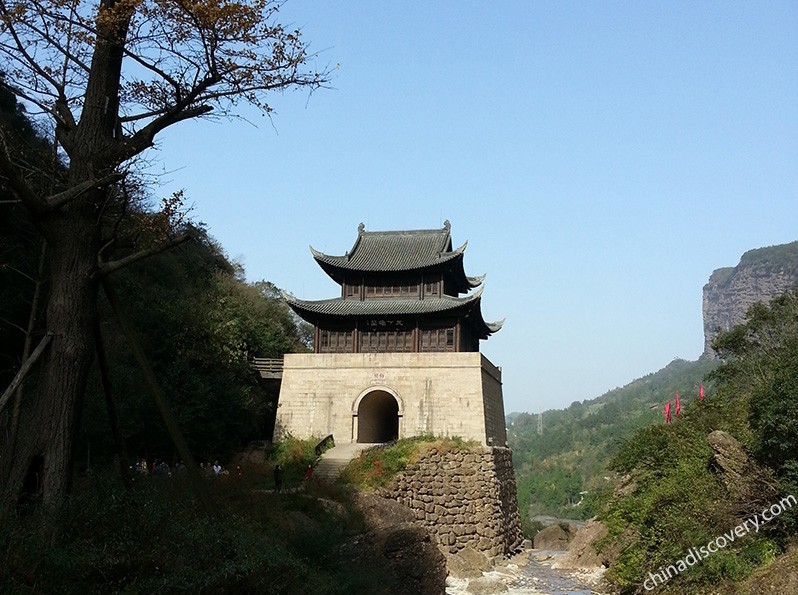 Guanlou
Guanlou
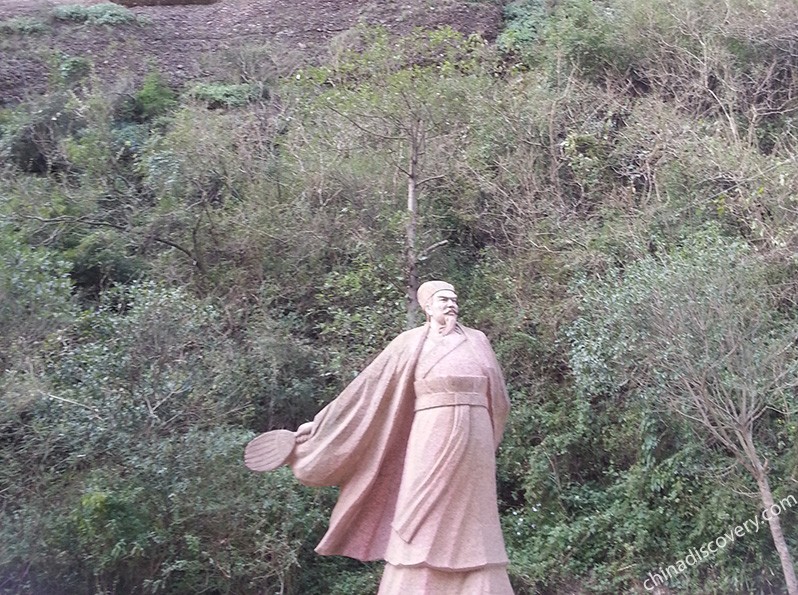 Statue of Zhuge Liang
Statue of Zhuge Liang
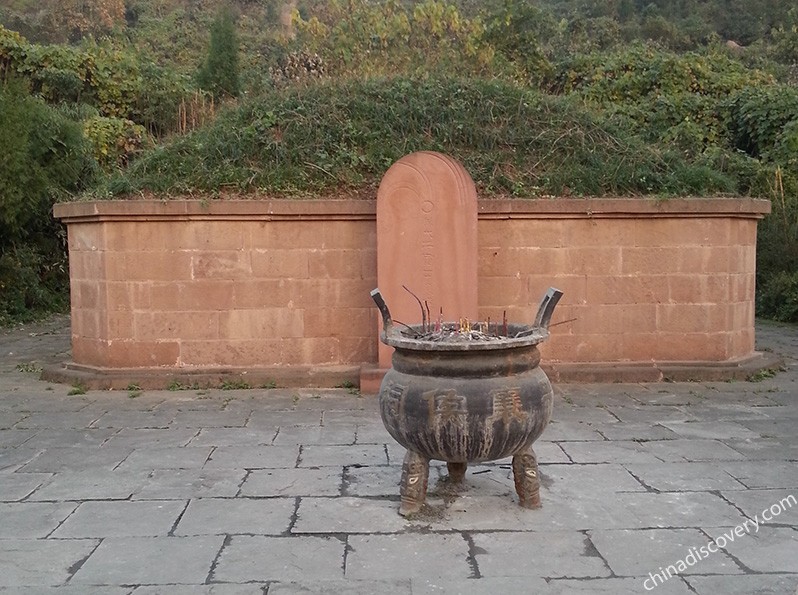 Statue of Jiang Wei
Statue of Jiang Wei
 Jiang Wei Palace
Jiang Wei Palace
 Red Star Square
Red Star Square
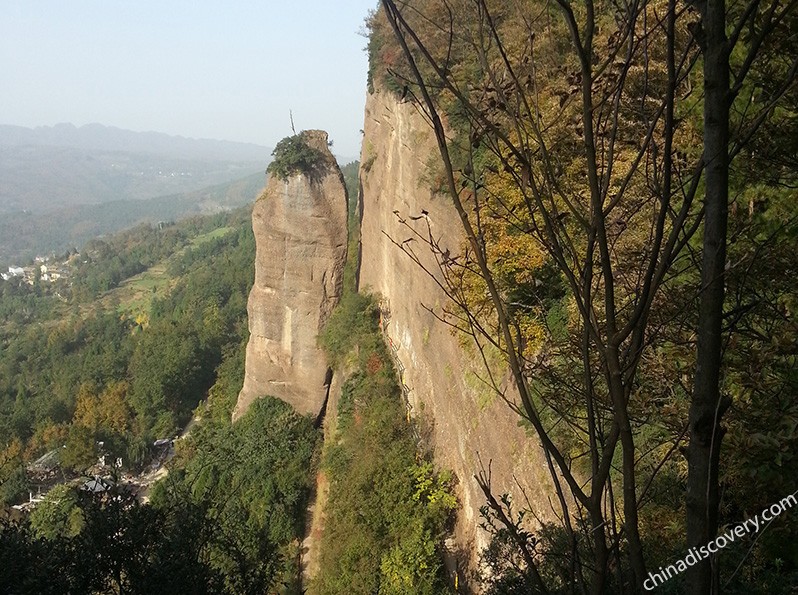 Stalagmite Peak & Plank Road
Stalagmite Peak & Plank Road
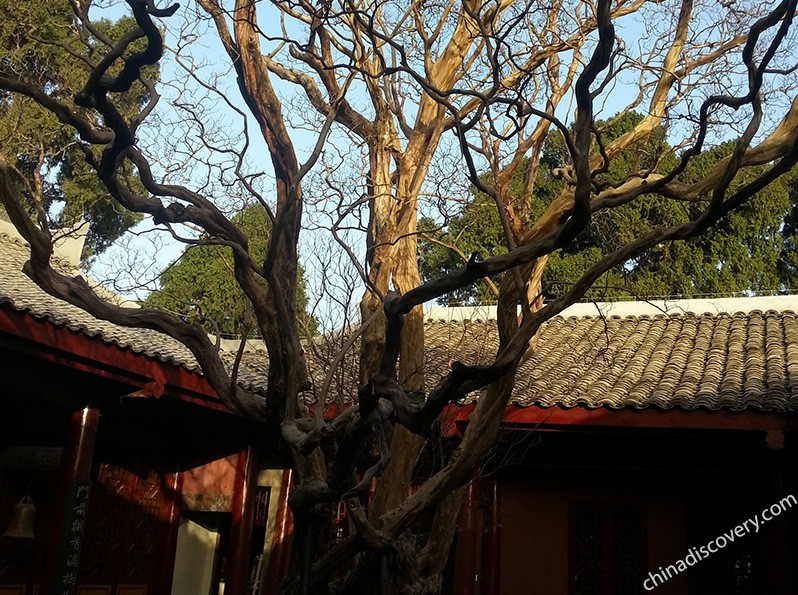 Liangshan Temple
Liangshan Temple
It is advisable to start you trip from the north gate, so you won’t miss the bird road which is such a narrow road that only one person can get through on his side. Later, get to Liangshan Temple before you meet Stalagmite Peak. Then, you can climb to Guanlou to have an overall sight of whole Jianmen Pass. After that, Jinniuxia Road is a wonderful place to have a walk. At last, you can get out from the South Gate after visiting Pingranghou Temple.
>> 4 Days Jianmen Pass & Langzhong Ancient City Tour with History Exploration
Cuiyun Corridor, also called emerald corridor, is a section of the Jianmen Shu Road flanked by over 8,000 cypress trees. Most of trees are aged more than 2,000 years old but still remained prosperously green and full of life. Walking on the old stone steps, you can find different shapes of the cypresses. Local people gave them beautiful names according to their postures and gestures. They are Arhat Cypress, Beauty Cypress, Marshal Cypress and many others. Each cypress has a legend which tells the history of the ancient road. Cuiyun Corridor is also a wonderful place to avoid the hot sun, and you will feel a pleasant coolness as soon as you enter Cuiyun Corridor..
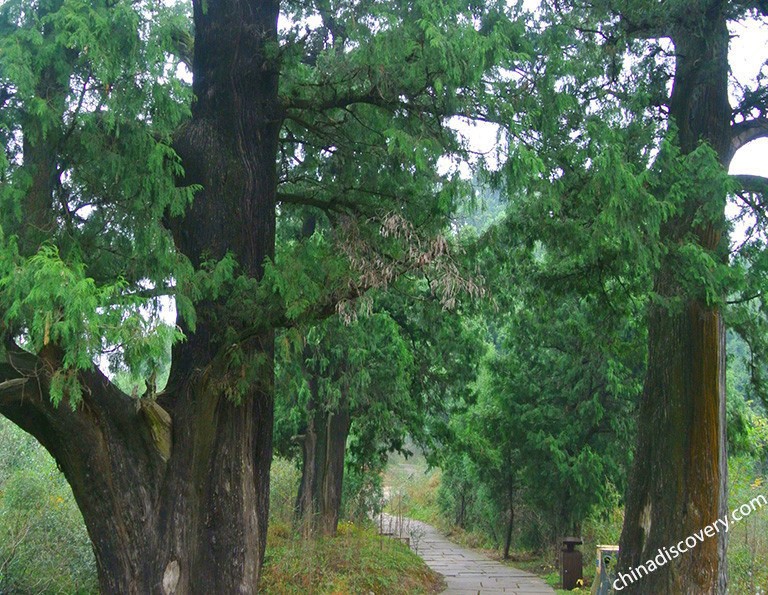 Cuiyun Corridor
Cuiyun Corridor
Jianmen Pass is located in the southwest in Guangyuan,
Nowadays, bullet trains are available from Chengdu to Guangyuan within 4 hours, and you can also get to Langzhong Ancient City and Chongqing directly by bullet train.
If you want to get rid of hustle of public transportation and troublesome navigation, you can book a private tour package which covers sightseeing, dining and transfer from us. Our local tour guide and driver will escort you to Jianmen Pass with speed and convenience, and take care of all the details. You just need to focus on sightseeing. Contact us if you need any help.
 Jianmen Pass in Autumn
Jianmen Pass in Autumn
 Tofu Dishes
Tofu Dishes
Top 3 Guangyuan tours chosen by most customers to explore Guangyuan in the best way. Check the detailed itinerary, or tailor your own trip now with us.
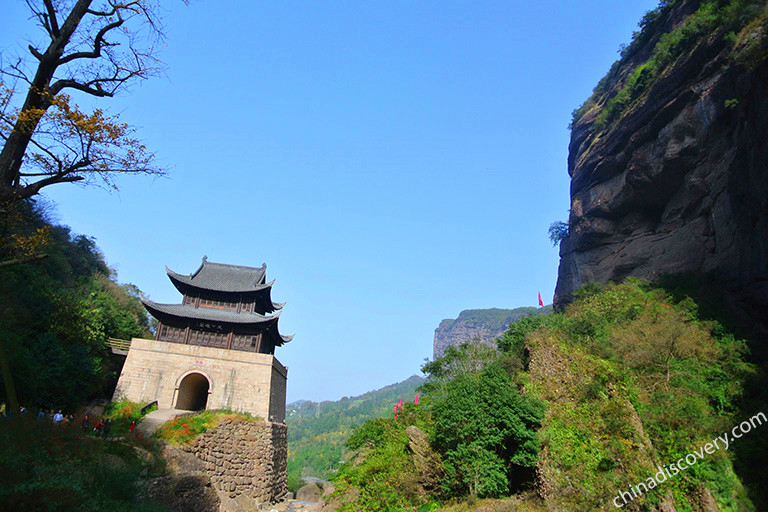
Chengdu / Jianmenguan / Langzhong / Chengdu
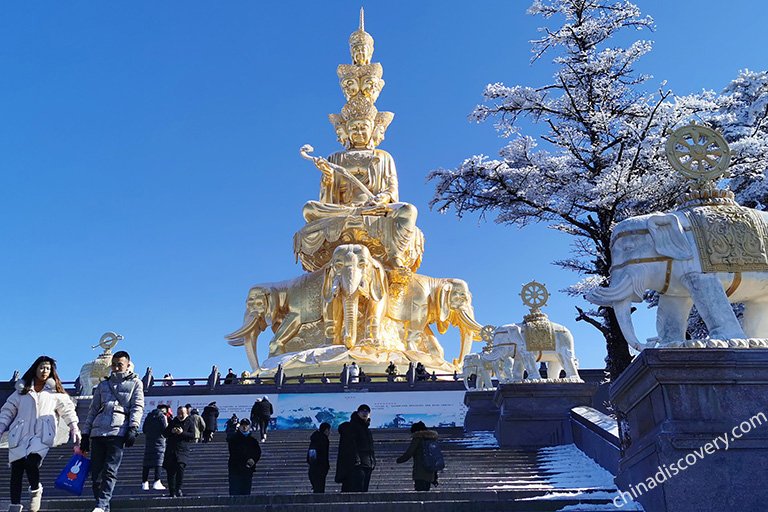
Chengdu / Leshan / Emei / Chengdu / Jiuzhaigou
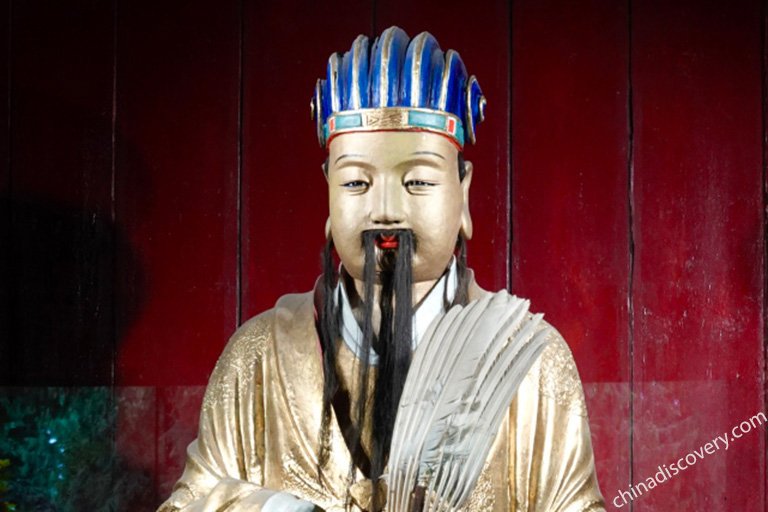
Chengdu / Guangyuan / Xian
Start planning your tailor-made holiday to China by contacting one of our specialists. Once inquired, you’ll get a response within 0.5~23.5 hours.
Customize a Trip